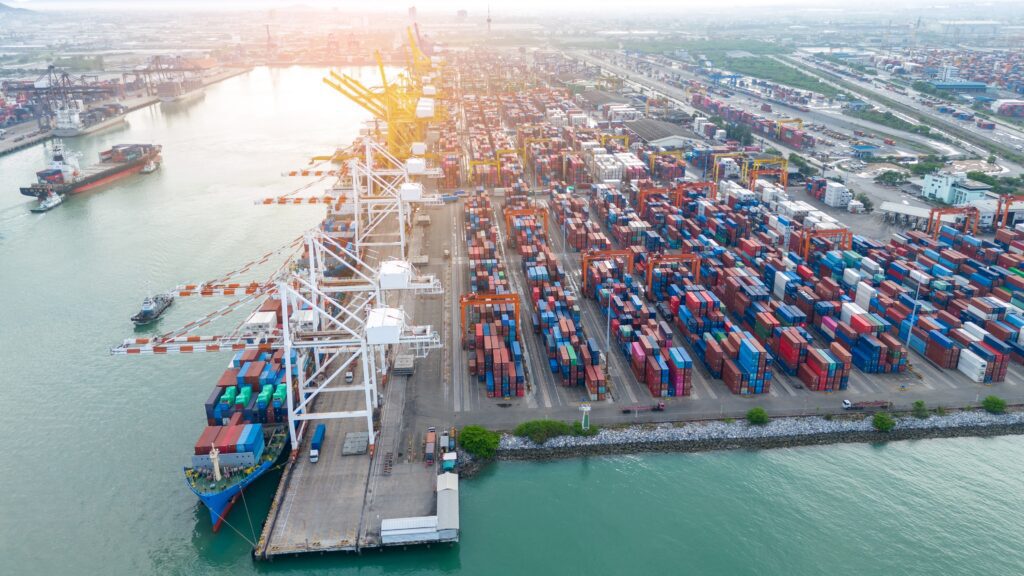On Tuesday, October 1st, 2024, the International Longshoremen’s Association (I.L.A) voted to strike, signaling the effective closure of the East and Gulf Coast’s busiest ports.

The Longshoremen’s Association, the largest union of maritime workers in North America, had attempted to reach a new labor contract with the United States Maritime Alliance (USMX) before their previous contract expired on September 30th, 2024. Along with general wage negotiations, the union had concerns about foreign interests in ports and automation threatening job security.
Negotiations stalled, and the strike began. The walkout is the first East Coast dock strike since 1977. Over 47,000 workers have left their posts and don’t plan on returning until their demands are met, essentially pressing “pause” on all port activities.
How the Port Strike Will Impact Businesses
The longshoremen strike has major implications for U.S. commerce. Incoming cargo ships must either divert to an operational port or sit idle until workers return. Not only will this inflate shipping costs heavily, but it also delays the arrival of any incoming shipments for U.S. businesses.
The port strike has macroeconomic consequences that may mirror the supply chain nightmare we experienced during the pandemic, if not worse.
Here are the industries that will be most impacted:
- Manufacturing: Manufacturers that rely on overseas material orders will likely have their operations delayed indefinitely unless they can establish a new supplier relationship. If manufacturers can’t order their next round of materials, their facilities will halt, and they’ll begin to hemorrhage money. It will cause a major slowdown, from electronics manufacturing to plastics and textiles, that might become the norm if there’s no progress in union negotiations.
- Construction: Similarly to manufacturing, a material shortage will limit what the industry can achieve. Available materials will be sold at a premium, while a majority of companies will go without access entirely. Whether construction companies pass this cost on to consumers or can handle the loss, construction activity will likely dampen for as long as the strike persists.
- Retail & eCommerce: When manufacturing encounters challenges, retailers and eCommerce businesses feel the pressure not long after. Inventory orders will become much more challenging, if not impossible, depending on the industry. If they can’t get their hands on products, the industry can miss revenue goals significantly. Companies that didn’t purchase their holiday inventory in advance will be impacted much sooner than their proactive counterparts.
- Food Service: Restaurants and food service providers may have incoming shipments of food spoil before the crates are unpacked. Not only does this cause an immediate loss of revenue, but it can put their operations on pause as they await the next shipment.
- Transportation: An industry that’s familiar with supply chain challenges, transportation will undoubtedly struggle until the strike ends. National Business Capital’s CEO, Joseph Camberato, stated in a Fox News interview, “Many companies over-leveraged themselves to handle the pent-up demand stemming from the pandemic. They didn’t make cuts quickly enough when demand changed, which has challenged the industry over the last 12-24 months. Supply chain disruptions equate to a loss of work.”
Almost any type of product that consumers and businesses rely on may experience delays and cancellations. In a recent Fox News interview, National Business Capital’s CEO stated, “On top of all this, [the strike is] wiping away all the work the Fed has done to get inflation under 3%. All the products that end up under the Christmas tree will be overpriced. Both businesses and consumers are finally starting to see the light at the end of the tunnel, and this can completely reverse everything.”
“If this goes on for a few days, I think it’s manageable. If it takes weeks, businesses and consumers will feel the impact quickly, definitely before the end of 2024,” added Camberato.
Watch our CEO’s full interview on Fox News above!
What Companies Can Do in Response
If the longshoremen strike will impact your operations, we urge you to take action as soon as possible. Here are some of the things you should consider:
- Buying in bulk from available suppliers, when possible, to qualify for bulk order discounts.
- How you’ll price your products/services. Will you take a loss because of the shipping delays, or will you pass that cost down to the consumer?
- Avoiding disruption. If you’re going to lose business, how can you supplement the lost income?
The sooner you ask yourself the hard questions, the better your company can respond accordingly.
National Business Capital is here to support businesses through this challenge and move forward into a brighter future. If you’re looking to leverage capital options to maintain your operations throughout the strike, an advisor on our team is ready to help.

